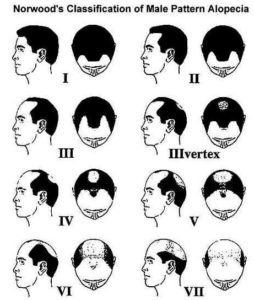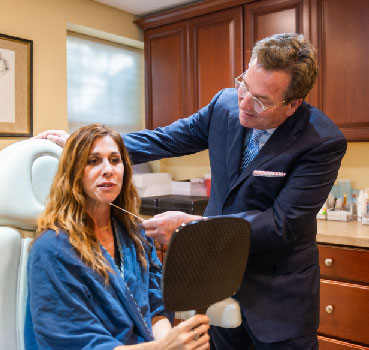HAIR LOSS IN MEN
LEARN ABOUT CAUSES AND TREATMENTS FOR MEN’S HAIR THINNING AND BALDNESS IN THE PHILADELPHIA AREA
Male pattern baldness is the most common cause of hair loss in men but there are also other possible causes. To treat hair loss in men effectively, Dr. Brian Buinewicz performs all consultations, diagnoses and classifies the hair loss, and then develops a personalized treatment plan.
Hair Loss in Men: What Is Male Pattern Baldness (Androgenic Alopecia)?
Male pattern baldness—medically known as androgenic alopecia—is a condition with a genetic component that causes hair loss in a typically predictable pattern. Men with androgenic alopecia often notice a receding hairline, as well as thinning on the crown or very top of their head, which can expand into a “bald spot.” Androgenic alopecia is very common, impacting up to an estimated 50 percent of all men by the age of 50 in the United States. Most men who are affected by this condition suffer from a genetic predisposition that makes the scalp overly sensitive to male hormones.
Approximately 40 million American men suffer from hair loss, driving the demand for safe and effective men’s hair loss solutions higher than ever before. Thanks to new innovations in hair restoration, men who suffer from male pattern hair loss or other types of hair loss have a range of treatment options to choose from, and they no longer have to struggle with the disappointment of ineffective or obvious hair restoration treatments.
Why Choose Buinewicz Cosmetic Surgery & Medspa for Alopecia Treatments in the Philadelphia Area?
Dr. Brian Buinewicz, a board-certified plastic surgeon, has considerable experience working with hair loss patients, starting every procedure with in-depth consultations that lead to personalized treatment plans and results. In addition to his experience with traditional hair restoration surgery, he also offers NeoGraft® in order to give his patients access to some of the best hair restoration technology available today.
Hair Loss in Men FAQs
What Else Can Cause Hair Loss in Men?
There are various types of hair loss in men, all of which can be linked to a number of factors, not just heredity.
In addition to androgenic alopecia, there are multiple other causes of hair loss in men, including chronic illnesses (viral or bacterial), infections (bacterial or fungal), chronic conditions (such as lupus, anemia, thyroid disorders, malnutrition), rapid intentional weight loss, certain medications or medical treatments (such as chemotherapy), hormone shifts, stress, thyroid conditions, poor diet and nutrition, an overactive nervous response, and personal grooming or style habits. Some of these factors cause temporary hair loss in men including thinning or balding of the hair, because when they resolve—for example, after finishing a round of medications or an infection clearing up—the hair regrows on its own.
Some causes of hair loss in men require a combination of approaches. Traction alopecia, for instance, is hair loss related to the constant wearing of tight hairstyles. Changing your hairstyle can help, especially if done early enough. More severe cases, where the follicles have already sustained lasting damage, require a different treatment, such as surgical hair restoration.
Other causes of hair loss in men include trichotillomania (a disorder characterized by impulsively pulling out hair), loose-anagen syndrome (a condition marked by hairs that are easily and painlessly pulled from the scalp by brushing and other common activities), alopecia areata (an autoimmune disorder resulting in baldness on the scalp and body), and scarring alopecia (resulting from injury, surgery, and other trauma that damages the skin and follicles).
Can Hair Loss in Men Be Corrected?
In some instances, bald or thinning patches of hair will regrow naturally without the need for medical treatment, but if you experience lasting hair loss, Dr. Buinewicz can recommend a course of treatment that will bring fullness back to your crown and hairline.
Modern hair restoration procedures are more advanced than ever before, giving men fuller crowns and hairlines that follow the natural cycle of hair growth. Most importantly, when compared to conventional hair transplantation methods, such as scalp reduction, tissue expansion, and flaps, modern men’s hair loss solutions involve fewer risks and provide better aesthetic outcomes with greater satisfaction and at a lower cost.
Request a Consultation
What Treatments Are Available for Androgenic Alopecia and Other Forms of Hair Loss in Men?
Non-Surgical Treatments for Hair Loss
Platelet-rich plasma, or PRP, is a non-surgical option that involves collecting a patient’s own blood, concentrating the beneficial platelets and the attached growth factors that stimulate blood vessel growth and collagen production to thicken the skin of the scalp, and injecting them into the scalp to revive failing follicles. Topical treatments such as Minoxidil or Rogaine help to improve blood flow to the scalp to counter hair loss. Finasteride, either oral or topical, helps to block the conversion of testosterone to its active form, which is the main cause of androgenic alopecia. Using gentle shampoos and conditioners and other topical treatments can be beneficial. There are also LED devices and hats to help with hair loss.
 Xtressé™ Nutrient Gummies are breakthrough, professional-grade nutraceutical supplement gummies that nourish hair follicles on a cellular level to support overall hair growth and scalp health. These hair growth gummies contain powerful generative compounds that are not usually found in other existing hair supplements, such as NAD+, pumpkinseed extract, taurine, and saw palmetto. Developed by the country’s top-rated dermatologists and hair restoration specialists, Xtressé™ Nutrient Gummies target the most common underlying causes of hair loss in men.
Xtressé™ Nutrient Gummies are breakthrough, professional-grade nutraceutical supplement gummies that nourish hair follicles on a cellular level to support overall hair growth and scalp health. These hair growth gummies contain powerful generative compounds that are not usually found in other existing hair supplements, such as NAD+, pumpkinseed extract, taurine, and saw palmetto. Developed by the country’s top-rated dermatologists and hair restoration specialists, Xtressé™ Nutrient Gummies target the most common underlying causes of hair loss in men.Surgical Treatments for Hair Loss
NeoGraft® provides a minimally invasive hair restoration procedure using innovative technology. The NeoGraft® device is an advancement on the traditional manual collection approach, automating the process for faster, more precise harvesting sessions. With the NeoGraft® procedure, each follicular unit of hair is precisely removed. Cutting a large strip of skin and hair from the back of the head is no longer necessary, and patients do not have any visible scarring. Patients are back to showering in about two days and can start resuming normal activities around two weeks. Hair regrowth usually starts around six months, but it can take one to two years to see the full regrowth of hair. All procedures for hair loss in men are performed in the comfort and privacy of our office, using local anesthesia.
Is a Surgical Hair Transplant More Effective Than Non-Surgical Hair Loss Treatments?
Non-surgical treatments, though highly beneficial for many patients, are only designed to reverse hair loss in men on very specific areas of the scalp, and they only provide patients with a temporary solution. Propecia® and Rogaine® are two well-known, FDA-approved treatments for hair loss in men due to male pattern baldness, but these options are inadequate for most men due to their short-term efficacy and the side-effects that result from long-term use. Non-surgical interventions can slow down hair loss and sometimes help reverse hair loss in men. A surgical hair transplant remains the gold standard for addressing hair loss in men.
WHY CHOOSE DR. ANNIE BUINEWICZ?
AT HUNTERDON COUNTY, NJ and BUCKS COUNTY, PA
Dr. Annie Buinewicz is a board-certified family medicine physician with over 25 years of experience. She holds additional certifications in medical weight loss, body contouring, hair restoration, and aesthetic injectables including Botox®, Daxxify™, and dermal fillers. Dr. Buinewicz takes a holistic approach to care, focusing on the overall health and wellness of each patient.
At Buinewicz Plastic Surgery, Dr. Buinewicz personally treats every patient — ensuring high-quality, individualized care in a practice that truly prioritizes medical integrity and patient-centered service.
What Should I Do Next for Men’s Hair Loss?
Scheduling a personal consultation with Dr. Buinewicz will help you further understand the best hair restoration treatment options for hair loss in men. Consultations only take 30 to 45 minutes, during which Dr. Buinewicz will go over your medical history and evaluate your scalp to determine if you’re a good candidate for hair restoration. If you are an ideal candidate for one of our state-of-the-art hair restoration procedures for hair loss in men, Dr. Buinewicz will describe the approach he’ll use and the results you can expect in further detail.
How Much Does It Cost to Treat Hair Loss in Men?
The cost of treatments for hair loss in men depends on the severity of each patient’s condition. After Dr. Buinewicz creates a custom treatment plan for hair loss in men, our office staff will be able to provide you with a more detailed breakdown of the procedure’s cost. Our surgical coordinator will go over the treatment costs and acceptable forms of payment, which include personal checks, cash, and major credit cards. We also offer financing and payment plans to make this procedure more affordable for our patients. Dr. Buinewicz’s specialized and advanced men’s hair loss solutions have made Buinewicz Plastic Surgery one of the most sought-after hair restoration centers for male pattern baldness.
Beyond Men’s Hair Loss Treatments: Are There Other Procedures Available?
Patients who are seeking solutions for hair loss in men may also want to address other cosmetic issues, including gynecomastia (the growth of breast tissue that causes female-appearing breasts due to a hormonal imbalance in men) or erectile dysfunction. Both are increasingly common problems for men to face as they get older and experience changes in hormone levels in their body.
Patients who have the opposite problem of alopecia—meaning too much unwanted hair—can opt for laser hair removal. In fact, it is possible to get treatments for men’s hair loss and hair reduction for other areas, such as the underarms, chest, shoulders, back, or arms!
For treating hair loss in men in the Philadelphia area—Doylestown in Bucks County, PA, or Flemington in Hunterdon County, NJ—call Buinewicz Cosmetic Surgery & Medspa at 215.647.9668 or send a message online.


